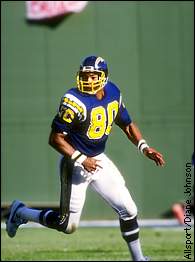| | By Joe Lago
ESPN.com
To become a member of the Pro Football Hall of Fame, you don't necessarily have to have great statistics to validate your Hall of Fame status.
You just have to have a claim to fame.
|  | | Kellen Winslow changed the way tight ends played in the NFL. |
Unlike baseball, basketball and hockey, football chooses its Hall of Famers on reputation as much as performance. A certain record or stat might be forever attached to the resumes of Canton's 204 members, but so is their place among their respective peers at that particular position. Defining their greatness is usually one simple yet succinct description.
Kellen Winslow caught 541 passes and scored 45 touchdowns in San Diego's Air Coryell offense, but he'll be remembered as the greatest tight end ever, mostly for his Herculean effort in the 1981 playoffs against Miami. Ex-Bears middle linebacker Mike Singletary was selected to 10 Pro Bowls, but he's known more for being the heart and soul of Chicago's famed "46" defense. Dwight Stephenson played in five Pro Bowls, but he's regarded as one of the game's greats at center.
Playing this game of word association could be fun while strolling through the Hall of Fame. Walk past the bronze monument of Steve Largent and the words "greatest possession receiver ever" immediately pop into your head.
Earl Campbell? One of the toughest running backs to bring down. Deacon Jones? Maybe the most feared defensive lineman ever.
Take this year's class. Joe Montana? Greatest quarterback who ever played. Ronnie Lott? One of the hardest hitters to roam a defensive backfield.
The point is, football players normally aren't affiliated with some incredible stat like Joe DiMaggio's 56-game hitting streak in baseball, Wilt Chamberlain's 100-point game in basketball or Wayne Gretzky's 92-goal season in hockey. For football players, greatness is defined by how people remember them. Most fans can't recite the fact that Dick Butkus played in eight straight Pro Bowls. They just recall the way he bursted into backfields to body-slam ballcarriers.
Some football Hall of Famers are known more for infamy. Jackie Smith caught 480 passes to become the third tight end to be inducted into the Hall, but most will tell you he's the sad sack who dropped a gimme touchdown in the Cowboys' Super Bowl XIII loss to Pittsburgh. Then there's O.J. Simpson -- we all know what happened to him. But his bust remains in Canton.
The numbers game doesn't apply so much to football Hall of Famers because of certain positions that aren't judged by stats. Linemen, for instance.
Those who wallow in the muck of the trenches get very little recognition. At least defensive linemen can rack up sacks. The only numbers associated with offensive linemen are holding penalties, false starts and their weight.
Offensive linemen do get their glory, especially if they form the foundation of a championship team. Guard Gene Upshaw and tackle Art Shell manned the left side of the Raiders' first two title teams. Both are in the Hall. Center Jim Langer and guard Larry Little anchored the middle of Miami's dynasty of the early '70s. They're in Canton, too.
But being the best at what you do doesn't necessarily get you into Canton. Just ask Ray Guy.
Guy, arguably the greatest punter of all-time and the best athlete on Oakland's Super Bowl title teams, used to hit the ceiling of the Superdome with his punts, but he has yet to gain entry into the Hall. He's been a finalist four times, including last year, and would be the first pure punter to be inducted. In fact, there's only one pure placekicker in the Hall (Jan Stenerud).
Numbers? Sometimes. Fame? Always. That's the ticket to the Pro Football Hall of Fame.
Joe Lago is the NFL editor for ESPN.com.
| |
ALSO SEE
Garber: What is a Hall of Famer?
Baseball: A battle at the border
Basketball: Open to all
Hockey: Will offensive cycles give Hall headache?
In-depth: The Hall of Fame debate
|

